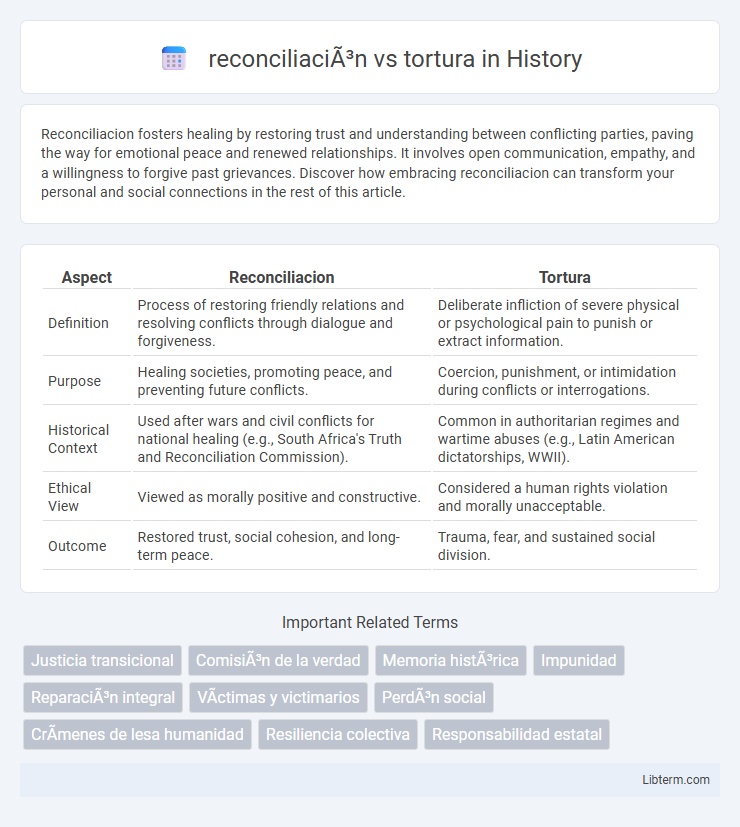Reconciliacion fosters healing by restoring trust and understanding between conflicting parties, paving the way for emotional peace and renewed relationships. It involves open communication, empathy, and a willingness to forgive past grievances. Discover how embracing reconciliacion can transform your personal and social connections in the rest of this article.
Table of Comparison
| Aspect | Reconciliacion | Tortura |
|---|---|---|
| Definition | Process of restoring friendly relations and resolving conflicts through dialogue and forgiveness. | Deliberate infliction of severe physical or psychological pain to punish or extract information. |
| Purpose | Healing societies, promoting peace, and preventing future conflicts. | Coercion, punishment, or intimidation during conflicts or interrogations. |
| Historical Context | Used after wars and civil conflicts for national healing (e.g., South Africa's Truth and Reconciliation Commission). | Common in authoritarian regimes and wartime abuses (e.g., Latin American dictatorships, WWII). |
| Ethical View | Viewed as morally positive and constructive. | Considered a human rights violation and morally unacceptable. |
| Outcome | Restored trust, social cohesion, and long-term peace. | Trauma, fear, and sustained social division. |
Entendiendo la reconciliación: Definición y principios clave
Reconciliacion involves restoring trust and harmony by acknowledging past injustices and fostering mutual understanding, contrasting sharply with torture, which inflicts irreversible trauma and violates human dignity. Key principles of reconciliation include truth-telling, accountability, and reparations, aimed at healing societal wounds and preventing future conflicts. This process emphasizes dialogue, empathy, and restorative justice to rebuild relationships and uphold human rights.
Tortura: Concepto, historia y consecuencias éticas
Tortura se define como el uso deliberado de dolor fisico o psicologico para obtener informacion, castigar o intimidar, practica documentada desde la antiguedad en diversas culturas y sistemas legales. Historicamente, la tortura se ha justificado en epocas de guerra y regimenes autoritarios, pero ha sido declarada ilegal por tratados internacionales como la Convencion contra la Tortura de la ONU. Las consecuencias eticas de la tortura incluyen la violacion de derechos humanos fundamentales, el dano irreversible a la dignidad humana y el deterioro de la legitimidad de las instituciones responsables.
Reconciliación vs tortura: Un contraste de valores fundamentales
Reconciliacion embodies the restoration of trust, justice, and human dignity after conflict or abuse, emphasizing forgiveness and mutual respect as pathways to peace. Torture, in stark contrast, represents a violation of human rights, inflicting physical and psychological suffering to exert power and control. The fundamental values of reconciliation prioritize healing and unity, while torture undermines ethics by perpetuating violence and dehumanization.
Impacto psicológico: Sanación frente a trauma
La reconciliacion promueve la sanacion psicologica al fomentar el perdon, la comprension y la reconstruccion de la confianza, lo que ayuda a las victimas a superar el dolor emocional y el trauma profundo. En contraste, la tortura genera heridas psicologicas severas, incluyendo trastornos de estres postraumatico, ansiedad y depresion, que dificultan la recuperacion y pueden afectar a largo plazo la salud mental. El impacto psicologico de la reconciliacion se orienta hacia la restauracion del bienestar emocional, mientras que la tortura perpetua el sufrimiento y el dano psicologico irreparable.
Perspectivas sociales: Construcción de paz vs perpetuación del dolor
Reconciliacion fosters social healing and peacebuilding by addressing collective trauma and promoting restorative justice, which helps break cycles of violence and supports communal trust. Torture perpetuates pain and social fragmentation by embedding fear, deepening distrust, and reinforcing cycles of trauma and retribution. Social perspectives emphasize reconciliation as a pathway to sustainable peace, while torture undermines social cohesion and the reconstruction of affected communities.
Reconciliación como herramienta de justicia restaurativa
Reconciliacion serves as a fundamental tool in restorative justice by fostering dialogue and healing between victims and perpetrators through mutual understanding and accountability. It emphasizes repairing harm and rebuilding relationships rather than focusing solely on punishment or retribution. This approach contrasts with torture, which violates human rights and obstructs genuine justice by inflicting trauma and perpetuating cycles of violence.
Tortura y la violación de derechos humanos
Tortura constituye una grave violacion de los derechos humanos, afectando la integridad fisica y psicologica de las victimas, y socavando principios fundamentales como la dignidad humana y el derecho a un juicio justo. Esta practica, prohibida por instrumentos internacionales como la Convencion contra la Tortura de la ONU, impide procesos de reconciliacion al perpetuar el dolor y la impunidad. La erradicacion de la tortura es esencial para la justicia transicional y la restauracion de la confianza en el Estado de Derecho.
Procesos exitosos de reconciliación en la historia
Successful reconciliation processes, such as South Africa's Truth and Reconciliation Commission, demonstrate the power of truth-telling and restorative justice in healing societies after periods of torture and human rights abuses. In Argentina, the Nunca Mas report exposed systematic torture during the military dictatorship, facilitating a societal commitment to memory and justice that fostered democratic stability. These examples highlight how transparent acknowledgment of past atrocities combined with accountability mechanisms can transform trauma into a foundation for lasting peace.
Obstáculos y desafíos en la búsqueda de la reconciliación
Obstaculos en la busqueda de la reconciliacion incluyen la persistencia de la impunidad y la negacion de las violaciones de derechos humanos, que perpetuan el sufrimiento de las victimas de tortura. La falta de verdad y justicia afecta la reparacion integral y dificulta el establecimiento de confianza entre comunidades afectadas y el Estado. Ademas, la estigmatizacion social y el trauma no abordado representan desafios significativos para la reconstruccion del tejido social.
Futuro y recomendaciones: Promoviendo culturas de reconciliación
Promoting cultures of reconciliation requires implementing comprehensive education programs that emphasize human rights, empathy, and the historical impact of torture. Establishing truth commissions and creating spaces for dialogue fosters transparency and healing, preventing cycles of violence and abuse. Continuous support for survivors through legal, psychological, and social services ensures sustainable peace and strengthens democratic institutions.
reconciliación Infographic

 libterm.com
libterm.com